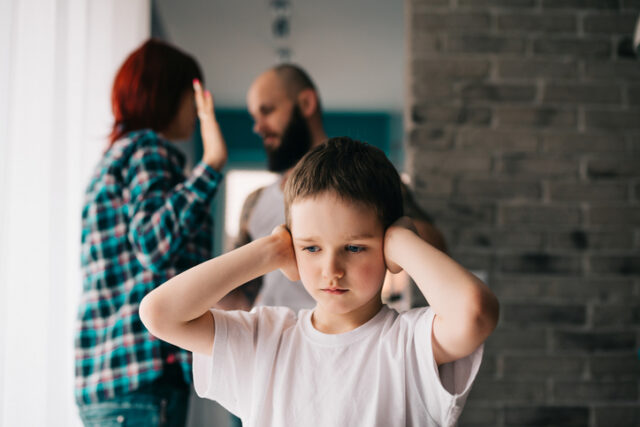Growing up around unpredictable anger doesn’t just disappear once you’re out of that house, unfortunately.

In fact, it often follows you into adulthood in subtle, complicated ways. If you were the kid always walking on eggshells, there’s a good chance some of that emotional training still shows up today, even if you’ve been to therapy or done a lot of inner work to process what you went through. Here are some things adults with that kind of past often do—without always realising where it came from.
1. Apologise for things that aren’t their fault

When you’ve grown up scared of someone’s reaction, saying sorry becomes a reflex. Even as an adult, you might find yourself apologising just to keep the peace, even when nothing’s actually your fault. It’s not about guilt, it’s about safety. You’re trying to prevent conflict before it even starts.
This constant apologising isn’t just about manners; it’s emotional self-defence. You’re subconsciously trying to manage the mood in the room before it flips. That habit is hard to unlearn when it once protected you from blow-ups you couldn’t control.
2. Overthink everything they say

Every message, every word, every sentence—overanalysed to death. It’s not that they don’t know what they want to say. It’s that they’re running it through 15 mental filters first, trying to make sure no one could possibly be offended, annoyed, or upset by it.
This comes from a childhood where the wrong tone could spark an outburst. So now, even in safe spaces, their brain still works overtime to avoid accidentally causing chaos, even if it’s not their chaos to manage anymore.
3. Flinch at raised voices, even if it’s not directed at them

Someone shouting in the next room? Their whole body tenses, even if it has nothing to do with them. It’s an automatic physical reaction because their nervous system still associates volume with danger. They might laugh it off or brush it aside, but deep down, their body remembers what came after the yelling. That kind of conditioning doesn’t vanish just because the threat isn’t real anymore.
4. Avoid confrontation at all costs

Even small disagreements feel massive. Voicing a different opinion? Terrifying. They’d rather bottle it up, change the subject, or even agree to things they don’t want—because anything feels safer than triggering someone’s anger. It’s not them being passive. It’s about survival instincts kicking in. When anger used to come with consequences, avoiding conflict became a skill. Even now, that old fear still whispers, “Don’t poke the bear.”
5. Constantly check in on how other people are feeling

“Are you okay?” isn’t just a polite question for them—it’s a way of gauging the emotional temperature. They’re hyper-aware of tone shifts, micro-expressions, and even subtle silences. It’s not curiosity; it’s scanning for danger. As a kid, emotional safety depended on being able to read the room instantly. That habit sticks, even when it’s not necessary anymore. And while it can make them great at emotional attunement, it’s also exhausting.
6. Laugh off their own discomfort

Joking about their anxiety, brushing things off with sarcasm, or making themselves the punchline—it’s all a way to deflect. If they can make it funny, maybe no one will take it seriously. Maybe they’ll avoid judgement or awkwardness. This is often a shield. When emotional vulnerability didn’t feel safe growing up, humour became the armour. It can make them seem light-hearted on the outside—but inside, there’s a lot they’re not saying.
7. Hate being a burden to anyone

Even when they need help, they hesitate. Asking feels risky. What if it annoys someone? What if it causes stress? They’d rather suffer quietly than feel like they’re making someone’s life harder. This usually stems from a childhood where needing things, emotional or practical, was met with anger, guilt, or blowback. So now, they try to be low-maintenance to a fault, even if it leaves them struggling in silence.
8. Take responsibility for everyone’s mood

If someone’s upset, they automatically wonder if it’s their fault. Even if there’s no reason to think that, their brain still jumps to “What did I do?” They’ve internalised the idea that they control the emotional climate. This isn’t about ego; it’s about wiring. As a kid, keeping the peace often meant trying to fix moods that weren’t theirs to fix. That dynamic doesn’t just disappear. It turns into adult habits that are hard to break.
9. Constantly try to prove they’re easy to love

They go above and beyond in relationships, not out of confidence, but out of fear. Fear that if they’re not always pleasant, helpful, forgiving, or flexible, people will walk away. Love, to them, can feel conditional. It’s often subtle—always being agreeable, never pushing back, avoiding anything that might make them seem “too much.” But underneath, it’s about trying to be safe from rejection by being as palatable as possible.
10. Freeze when someone’s upset with them

A raised eyebrow, a cold tone, or an unanswered message? It can completely throw them. Instead of addressing it, they shut down or spiral, replaying everything they said, trying to pinpoint what went wrong. This kind of freeze response usually started young. When someone’s anger felt unpredictable or scary, the safest option was silence. As an adult, that same freeze kicks in, even when the threat isn’t real anymore.
11. Assume strong emotions are unsafe

Whether it’s their own or someone else’s, big feelings make them nervous. Joy, sadness, anger—they all feel like they’re walking a tightrope. So instead, they aim for “fine.” Not too happy, not too sad—just flat enough to stay safe. They’ve learned to suppress intensity because it used to lead to chaos. Even in safe environments now, they struggle to express or even fully feel emotions. Neutral feels safer than vulnerable.
12. People-please without even realising it

It’s not fake; it’s survival. They’re not trying to manipulate anyone. They’re just conditioned to keep everyone else happy as a way to avoid conflict or discomfort. Pleasing people feels like protection. This can lead to exhaustion and resentment, especially when they don’t get the same care in return. But for them, keeping everyone around them calm feels like the only way to stay emotionally safe.
13. Not trust peace when it shows up

Quiet, stable environments can make them uneasy. When you’re used to explosions coming out of nowhere, calm starts to feel suspicious, like a setup. Instead of enjoying peace, they brace for impact. Even when life is good, they might overthink or self-sabotage. It’s not because they want drama—it’s because unpredictability was the norm. And peace, no matter how gentle, can feel foreign and unsafe.
14. Minimise their own needs constantly

They’ll say they’re fine when they’re not. They’ll push through when they’re exhausted. They’ve learned that needing too much leads to disappointment—or worse, anger. So now, they downplay everything. This doesn’t mean they’re strong—it means they’re scared of taking up space. Minimising their needs is a defence against being dismissed or punished for having them in the first place.
15. Second-guess themselves in every decision

Because they grew up constantly wondering if they were doing something wrong, they carry that doubt into adulthood. Even the smallest choices get run through a mental filter of what-if scenarios and imagined consequences. This can make them seem indecisive, but really, they’re afraid of getting it wrong and triggering negative fallout. Their self-trust was built in a pressure cooker—and it still shakes, even when no one’s watching anymore.




